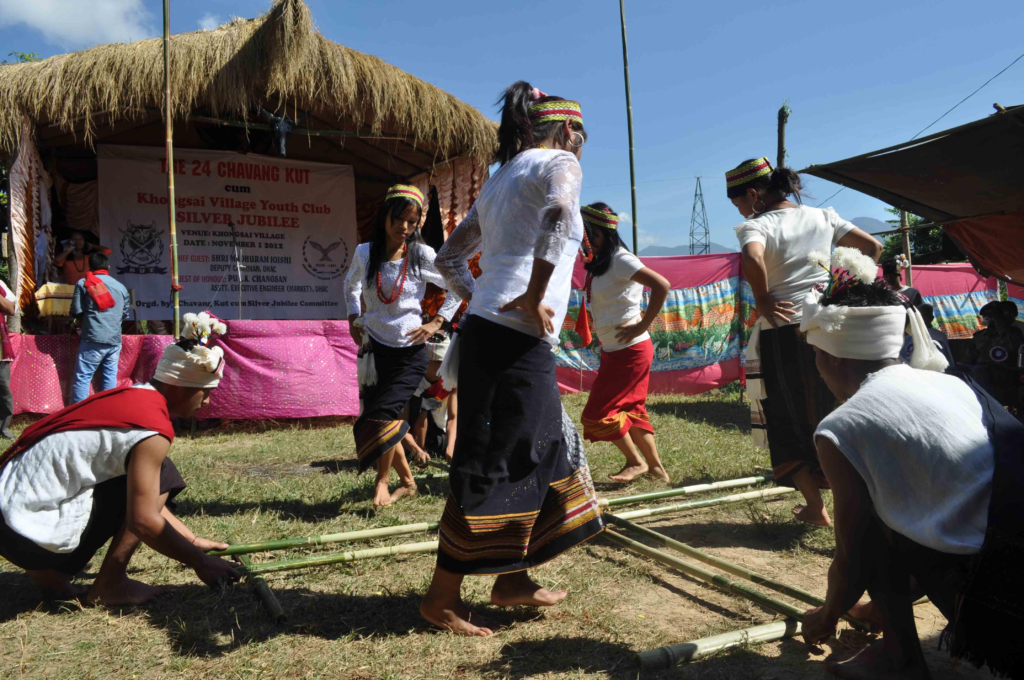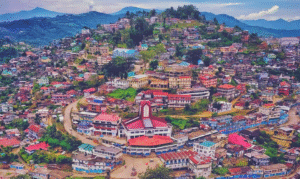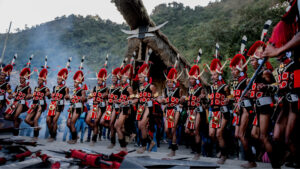The Kuki tribe is mostly located in the states of Manipur, Nagaland, Mizoram, and Assam. However, Tripura too has some sections of Kukis. They add to the culture and history of the state. The Kuki people have very deep roots in the hills and valleys, giving them a distinct identity that is reflected in their rituals and belief systems.
Some populations of the Kuki tribe clan also reside in the fertile hills of Tripura. They value their rich past that alternates between fantasy and reality. The legends of the Kuki Tribe have been passed down for centuries through their talks of heroes and Gods, wars waged and victories won.
A significant part of their culture revolves around remembering warrior ethos, and the valor of the tribe’s brave fighters. These narratives bring them pride as they think of their acts of bravery, which reflects the challenges the Kuki Tribe has faced and conquered over time.
What is folklore?
The art of storytelling culture, beliefs, tales, riddles, myths, fables, and poems with no written language is known as folklore. Lore means the oral narration. These stories survive because they are entertaining and relevant to a certain culture or group of people. In traditional societies, folklores are used to educate, enlighten, and even help in developing intelligence. Riddles and tongue twisters help in developing skills while some stories are used to enhance imagination. History and wisdom are passed down through folklore. Because they rely so much on storytelling, they excel in their languages. Folklore builds the literary literature of the population. Oral literature is useful and crucial in many tribes. Kuki Tribe too, relies on it while preserving their history and way of living.
The idea behind Kuki Tribe folklore
Nature is the Kuki people’s valued companion. They see nature more than their environment. They think of them as a living entity that has been with them for many years. Nature speaks via their mythological tales. For the Kuki tribe, mountains communicate, rivers tell stories, and woods offer secrets, all of which reflect the tribe’s healthy relationship with nature. The Kuki stories depict nature as a living, breathing creature that is inextricably linked to their being. Their existence isn’t one without nature.
Beyond stories, the Kuki tribe expresses its connection with nature through folk songs and dances. Each beat and step captures their celebration with nature. It is performed in colorful costumes that imitate the colorful spirit of their traditions.
The oral tradition of the Kuki tribe serves as a timeless connection between generations. Elders, and storytellers from the past, pass along the cultural torch, making sure that the flame of Kuki identity burns brightly for many years to come.
As the world changes, the Kuki tribe remains true to their cultural practices. Their unique stories are passed down from lips to ears as they continue to shape the Kuki Tribe and their community. They find strength in its heritage, and pride in its journey through the hills of Tripura.
Kuki Folklore
The Kuki tribe is an indigenous community with a rich cultural past. They have a diverse set of folklore that is passed down orally. It reflects the history, beliefs, and traditions of its people. Spanning generations, Kuki folklore is a mix of myths and legends, which have been passed down through the ages.
The Origin Myth of the Kuki Tribe
One widespread theme in Kuki folklore is the origin myth. It explains the tribe’s emergence and connection to their land and neighbors. Some Kukis believe mankind formerly lived in the earth’s bowels (cave). The Khongjais and Meiteis were brothers. One day, they argued over a fabric, and their mother pulled out a knife and cut it, but their mother assisted the younger Meiteis, thus Meiteis wore more clothing than the Khongjais, subsequently known as Kukis.

Another folklore says that Meiteis chopped Heimang trees whereas Kukis cut plantain trees. Finding the footprints fresh, many people followed the brother who chopped the Heimang trees, but the one who cut the plantain appeared to be extremely old, and few people followed him who became Khongjai.
Kuki Warrior Ethos
Legends surrounding the Kuki Tribe warrior ethos are also prominent in their folklore. Tales of brave warriors, skilled in the art of combat, narrate the tribal history of conflicts, conquests, and the valor that defines the Kuki Tribe community. These narratives often highlight the importance of courage, honor, and unity among the Kuki warriors.
Spiritual Beliefs
Spiritual beliefs play a significant role in the lives of the Kuki Tribe. They narrate stories of gods and goddesses who govern various aspects of life. These deities are honored for their compassion with prayers in an attempt to invoke their presence during rituals and ceremonies. Folktales surrounding these divine beings suggest moral lessons, emphasizing virtues such as kindness, humility, and gratitude.
The Kuki Tribe and its bond with Nature
The Kuki tribe’s relationship with nature is intricately woven into their folklore. Myths and legends personify natural elements like mountains, rivers, and forests, depicting them as living entities with distinct personalities. These narratives emphasize the importance of environmental harmony and the interconnectedness between the Kuki people and their natural surroundings.
Folk Songs and Dances of Folklore
In addition to myths and stories, Kuki folklore contains a large number of folk songs and dances. These artistic demonstrations help to preserve cultural traditions. They are performed during festivals, rituals, and social events. The periodic beats of ancient Kuki instruments, along with their dramatic costumes, create a very exciting storytelling experience.

Conclusion
The oral tradition is crucial in preserving and transmitting Kuki Tribe folklore from one generation to the next. Elders within the community play a pivotal role in recounting these stories during informal gatherings, passing on not just the narratives but also the values embedded within them. This oral transmission ensures the continuity of the Kuki Tribes cultural heritage and fosters a sense of identity among the tribe.
As with any folklore, Kuki stories continue to evolve, adapting to contemporary times while retaining their cultural essence. Efforts to document and study Kuki folklore are essential for preserving this invaluable heritage and providing insights into the history and worldview of the tribe. In a world of rapid change, the rich tapestry of Kuki folklore serves as a testament to the resilience and enduring spirit of this vibrant indigenous community.
Unravelling a billion untold stories, one chapter at a time, Humans of Northeast takes you on a discovery through vibrant Northeast India – a land rich in people, places, and culture. Ready to immerse yourself in more such stories? Visit our page HONEI to read more about narratives that inspire and uplift.






